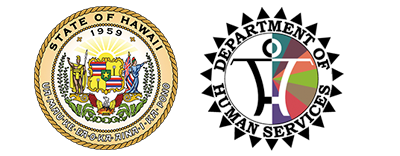Frequently Asked Questions (FAQs)
How do I apply?
Call Ho‘opono at 586-5269 or email your interest to apply for services at [email protected]
What if I disagree or am dissatisfied with the services I am receiving or my Counselor?
If you disagree or are dissatisfied with any decision or action taken by your assigned VR Counselor, you should inform your Counselor and try to work this out. If you are unable to work this out with the Counselor you should try to resolve your situation with the Counselor’s supervisor or the VR manager. If you are still unable to resolve your situation you may Request for a Review of the decision or action at a Due Process Hearing conducted by an Impartial Hearing Officer or through Mediation conducted by an Impartial Mediator, or both. You can also request for assistance or advice from the Client Assistance Program. Your VR Counselor should give you the information you need to request for a review and to contact the Client Assistance Program.
Whom can I contact with comments or questions about program services?
If you have comments or questions about Ho‘opono’s services, please contact us at 586-5269.
Where are you located?
Ho‘opono is located at 1901 Bachelot Street in Liliha. If traveling mauka on Liliha Street, take a right on Kuakini Street. Bachelot Street will be the first left after Kuakini Hospital. If traveling mauka on Nuuanu Avenue, take a left on Kuakini Street. Bachelot Street will be the first right before Kuakini Hospital.
What type of services does Ho‘opono provide?
Ho‘opono provides vocational rehabilitation services for persons who are blind and visually impaired seeking gainful employment. Prior to job placement, training in the skills of blindness are taught through classes in Braille literacy, Computer Assistive Technology, Orientation & Mobility (Cane Travel) skills, Woodworking Classes to develop self-confidence, recreational and leisure community activities, Personal and Home Management classes and BOBB (Business Of Being Blind) classes.
Persons who can benefit by using low vision aids and appliances may receive a free eye examination and consultation from the optometrist in the Low Vision Clinic. Low Vision Clinic patients must be referred by their optometrist or ophthalmologist.
What is the New Visions program?
The “New Visions” program is a curriculum of classes focused on students gaining the knowledge, skills and positive attitude they need to achieve success in life. Lesson plans are strategically aimed at students acquiring the alternative skills of blindness through structured discovery training. As an extension to the daily training program, Ho’opono also includes a residential component where evening and weekend experiences allow students to practically apply the skills they are learning at the Center. This extension of the New Visions program significantly impacts and expedites the students’ progress.
What is the Older Individuals Who are Blind (OIB) Program?
Persons age 55 and over who are blind and visually impaired are served by Ho‘opono’s OIB Program. Rehabilitation Teachers conduct home assessments for an individual’s needs in order that the older blind or older visually impaired person may be empowered to live productive and active lives. Activities of daily living such as walking about, self-care skills, cooking, organizing, reading, shopping and cleaning, are examples of areas where our Rehabilitation Teachers have helped.
What is the Business Enterprise or Vending Program?
The Business Enterprise Program or Vending Program affords persons who are blind to operate food concessions on Federal, State and County properties. Hawaii’s program also includes military troop dining facilities with the U. S. Navy and U.S. Army. Governed under the Federal Randolph-Sheppard Act and Hawaii’s own mini Randolph-Sheppard Act, blind vending facility operators receive training and consultation to operate their own businesses. The Business Enterprise Program and individually licensed blind vendors also benefit from vending machine income.
What is the Low Vision Clinic?
The Low Vision Clinic offers free eye examinations and re-examinations for blind and visually impaired persons referred by their eye physicians. While some persons may not be able to benefit from the Low Vision Clinic services, many others may benefit from a prescribed low vision aid or appliance used for reading or for enjoying hobbies, etc.
How can Ho‘opono help to inform the general public about blindness?
Ho‘opono can help by conducting presentations concerning the Prevention of Blindness and/or Education about Blindness. Employers are also invited to call on Ho’opono for in-service training to benefit their employees who serve consumers who are blind or employees who are visually impaired or blind.
